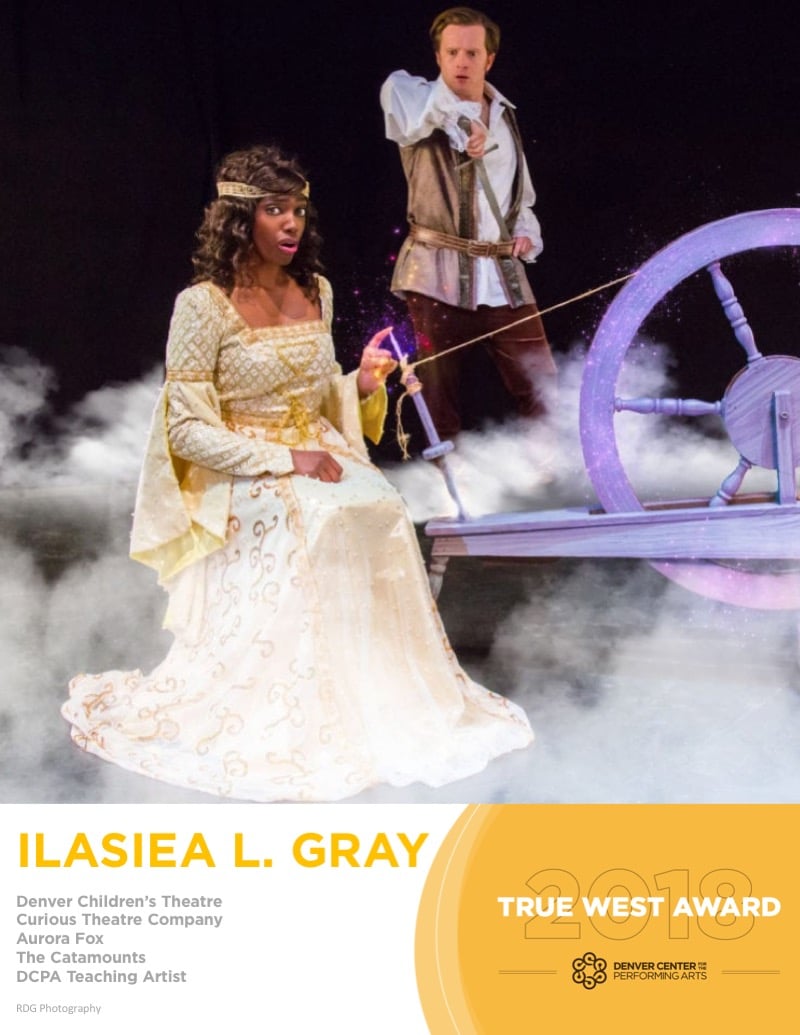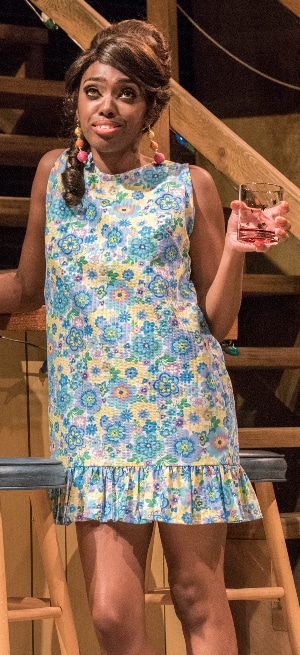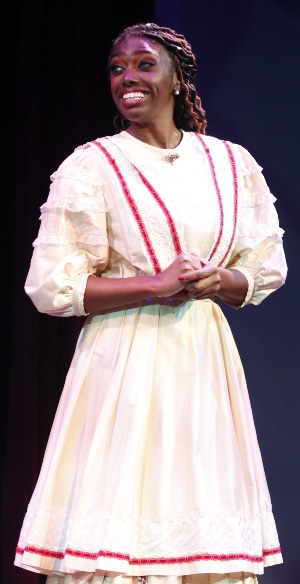DCPA NEWS CENTER
Enjoy the best stories and perspectives from the theatre world today.
Enjoy the best stories and perspectives from the theatre world today.

Emerging Denver actor Ilasiea L. Gray made the most of a regrettably rare opportunity last spring to play a princess of color for 6,000 young audiences of the Denver Children’s Theatre. More than that, she made history.

Ilasiea L. Gray in Curious Theatre’s ‘Detroit 67.’ Photo by Michael Ensminger.
Gray, who graduated from Thomas Jefferson High School and The University of Colorado Denver, had a big year in 2018 – thanks largely to her breakout performance in Curious Theatre’s Detroit ’67, a powder-keg of a play that featured Gray as a spunky, sexy Bunny looking for fun even as riots were starting to break out in the Motor City in 1967.
But nothing gave Gray more pride than playing the first African-American Sleeping Beauty for a local theatre company – and then getting to talk with the children in the audience about it.
“I am so passionate about children’s theatre, and the smiles I see on these kids’ faces – especially the smiles I see on little black kids’ faces — is magic,” Gray said. “Representation matters. I cannot tell you what it would have meant for me as a young girl to have seen a black lead character — especially a princess — in the live theatre. Someone I could hug and talk to afterward, as opposed to a movie.”
Director Steve Wilson, who compiled decades of experience imagining nontraditional actors in traditional roles as the former Artistic Director of Denver’s Phamaly Theatre Company, which exists to provide performance opportunities for actors with disabilities, would like to take credit for having the foresight to cast Gray as some sort of an intentional statement. She was just the best actor for the role of Briar Rose (a k a Sleeping Beauty).
”It starts with the luck of the draw,” Wilson said. “Ilasiea had to walk in the door to audition, and luckily for us, she did. I didn’t cast her because she is a person of color. I cast her because she is incredibly talented.”
In the audition, it never occurred to Gray that she might be cast to play the title role. “As an actor of color, you don’t even think that’s possible,” Gray said. “I am so grateful to Steve for taking a chance.”
But it didn’t really hit Wilson that casting Gray was particularly significant until the opening performance. “I looked around in the lobby and I said, ‘Wow, there are an awful lot of little African-American girls here,’ ” Wilson said. “And then I projected forward and realized that while they had probably seen a million white versions of Sleeping Beauty in their lifetimes, they could not have known that they were about to see an actor who looked like them.”
And when that realization fully hit Wilson, he said, “I literally ran into my office and burst into tears.”
Gray said the run was not without its challenges. “Not all audiences are as progressive or accepting as they like to think,” she said. One kid walked up to Gray and flat-out said she didn’t look like Sleeping Beauty from the animated film. Gray, a DCPA Teaching Artist for the past several years, took that as an opportunity for connection.
“I am so happy to remind kids that princesses — and regular people — come in all shades, shapes and sizes, and can look many different ways,” she said. “As an arts educator, it is an honor to be the vessel for these teachable moments. The beauty of children is that they are impressionable, but also more adaptable in changing their world view. It is the steadfast adults I am worried about.”
While actors of color are grossly underrepresented on stages around the country, progress was made this year in Colorado. Curious Theatre has made a commitment to diversity in casting part of its ongoing mission. The Colorado Shakespeare Festival staged a Love’s Labour’s Lost where none of the four female romantic leads were white. The Denver Center Theatre Company set Oklahoma! in an African-American town; it for the third time presented a bi-racial Cratchit family in A Christmas Carol; and this weekend it closes its Theatre for Young Audiences production of Corduroy, the story of a black girl that already has been seen by more than 25,000. And Phamaly, the undisputed leader in this area, presented an Into the Woods with an ensemble that reflected the entire spectrum of colors and abilities. For a company like Phamaly, there is no such thing as traditional casting.
 “It feels like there is a trend toward more inclusivity in casting at our theatres, and that only enhances the art, the artist and the community,” Wilson said. “When you shake up a person’s perceptions and expectations about what a story and its characters should look like, you deepen the experience for the audience by encouraging dialogue and tolerance. And hopefully that diminishes prejudice.”
“It feels like there is a trend toward more inclusivity in casting at our theatres, and that only enhances the art, the artist and the community,” Wilson said. “When you shake up a person’s perceptions and expectations about what a story and its characters should look like, you deepen the experience for the audience by encouraging dialogue and tolerance. And hopefully that diminishes prejudice.”
Gray’s 2018 was marked by many other triumphs. She played the title role in Curious Theatre’s BLACK, a school touring production that is set at a vigil after a black boy is killed by police. The play is a conversation between two mothers – one white and one black. It is, Gray said, a call to action. “I am all about activism, and what a gift it is to be in the room, reaching hundreds of people who are confronted with the topic of race, and discussing how we can all be better,” she said. “The conversations afterward are so different but they are all so real, at times tough and always inspiring. I always leave humbled and hopeful.”
Gray was later featured in The Catamounts’’ Men on Boats, and, for something completely different, is now appearing through December 23 in the Aurora Fox’s madcap holiday sketch comedy Twist Your Dickens.
Critics corner: “Played with vibrant smarts by Ilasiea Gray, Bunny knows how to make an entrance. Her every ensemble looks like something Diana Ross would don for an album cover shoot. Bunny is finger-snapping knowingness, the embodiment of what would now be push notifications.” – Lisa Kennedy, The Denver Post

Ilasiea L. Gray Aurora Fox’s ‘Twist Your Dickens,’ through December 23. Photo by Brian Landis Folkins.
Ilasiea L. Gray: 2018
The True West Awards, now in their 18th year, began as the Denver Post Ovation Awards in 2001. DCPA Senior Arts Journalist John Moore — along with additional voices from around the state — celebrate the entire local theatre community by recognizing 30 achievements from 2018 over 30 days, without categories or nominations. Moore was named one of the 12 most influential theater critics in the U.S. by American Theatre magazine in 2011. His daily coverage of the DCPA and the Colorado theatre community can be found at MyDenverCenter.Org
